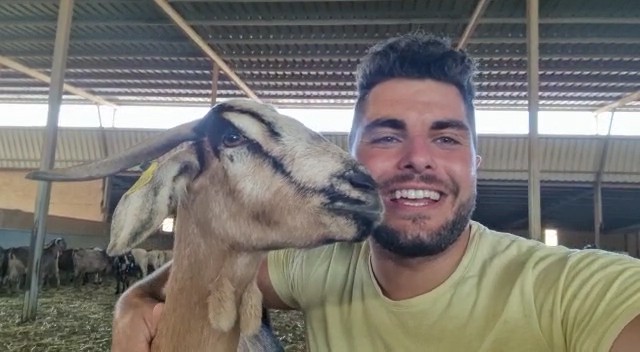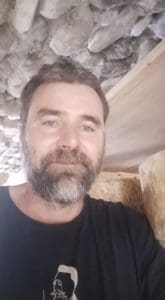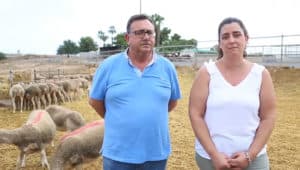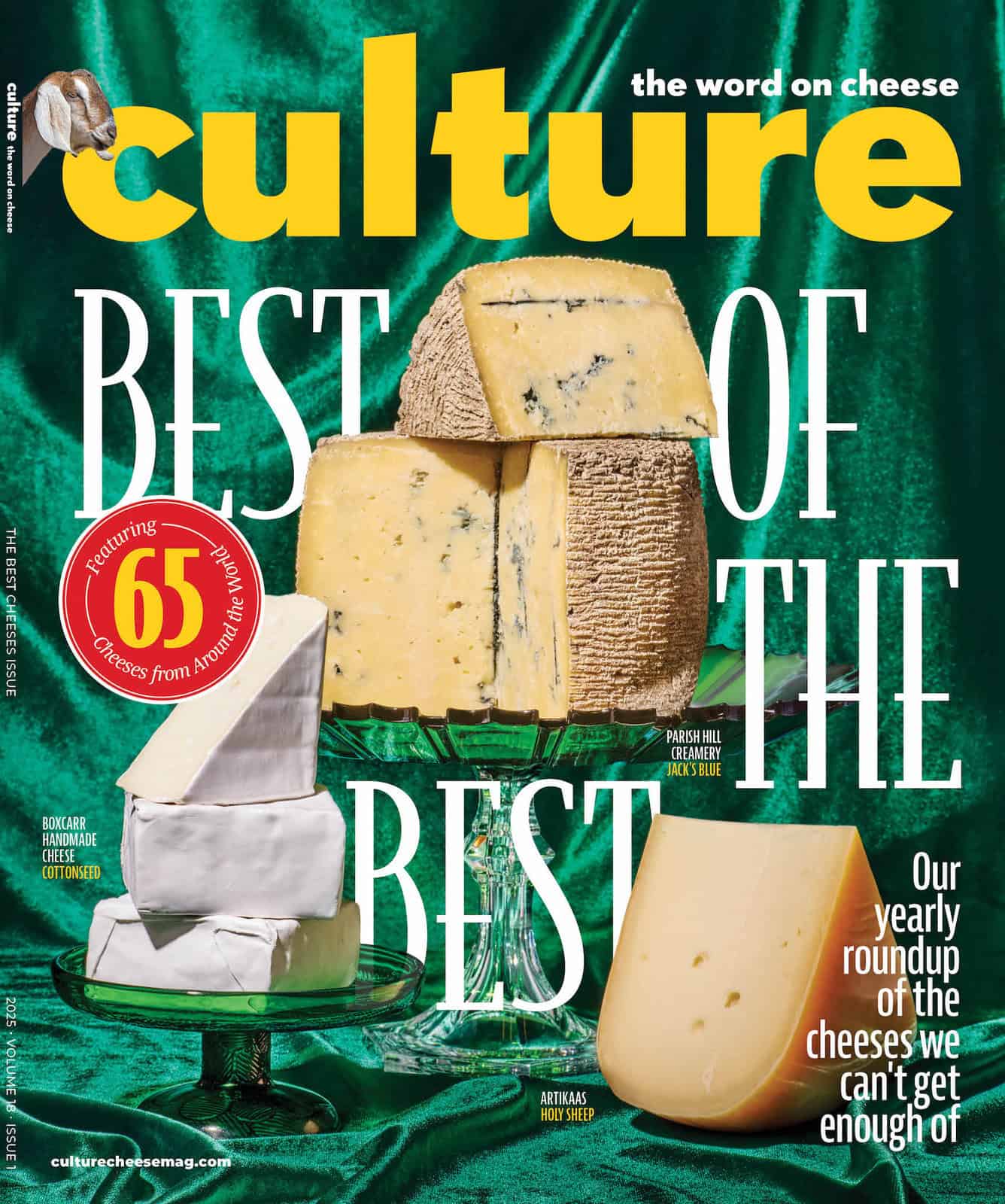
I am the owner of Caprarius Dairy and I am a cheesemaker. We are on the island of Fuerteventura, located in the village of Pajara, in Mezque. I want to say that we make Majorero cheese with denomination of origin, and also that tending to animals isn’t a profession only for older people but also for young people like me—I am 30 years old. This requires sacrifice but at the same time it is very beautiful, for we are rewarded with these animals who love us so much. — Rayco Ramos Rodríguez, Quesería Caprarius
Cheese importer says that the solution requires an image update
Spain has a shepherd problem, and Michele Buster is on a mission to fix it. The co-founder of New York City-based importer Forever Cheese, Buster became aware of the seriousness of the issue due to a major Manchego shortage early last year. Because Manchego PDO can only be made in Castilla La Mancha from the milk of Manchega sheep, a decline in the number of the region’s farms and shepherds were contributing factors to the shortage. “But it’s not just about La Mancha, it’s every single region,” Buster says. With fewer young people willing to take on the hard work of animal husbandry, Spain’s centuries-old dairy farming and cheesemaking traditions have suffered.
The problem isn’t new, but it has gotten progressively worse since 2015, when the New York Times reported on Catalonia’s shepherd school, then one of four scattered around the country. There are now at least a half-dozen, including a program just for women launched in Cantabria in 2021. According to the Times, the school’s appeal “was not so much due to Spain’s near-record unemployment as it was to people’s desire for an alternative to the hustle and bustle of urban life.” That desire has only intensified since the pandemic, which gives Buster hope.
We are Quintian Farm; my name is Chelo and this is my daughter Alba. We are located in northern Spain, more precisely in the north of Galicia. We have been dairy producers for the last 12 years. Our products are sold directly, from fresh milk to cheese. We are proud to live where we want, to add value to a territory, and to to guarantee our lineage passing this all down to the next generation—something very important to keep the villages alive.— Gandería Quintián
Schools are important, Buster says, but to get people interested in attending them requires updating the image of the shepherd. “It’s not just an old guy with a beret and a stick.” Many of the shepherds who produce the cheeses she imports belie that stereotype—they have interesting, full lives beyond the farm and field. For example, Père Pujol, who after an earlier career in education returned to his native Pyrenees, where he has been making artisanal cheeses with raw cow’s milk for 13 years. When he is not working, he likes to dine in fine restaurants. Others have followed a similar pattern; they are drawn to a lifestyle where they can live in harmony with nature, and feel that they are making a difference in the preservation of the environment and of rural traditions.
I am 45 years old and I have been making artisanal cheeses using raw cow’s milk for 13 years. We are located in the Pyrenees, in La Cerdanya (Catalunya), which is an ideal microclimate for making cheese, with green mountain meadows. We have our own herd of Fresian cows and over the years we have made a wide range of cheeses. We produce washed-rind cheese, cooked paste cheese, tomme blue-type cheese, cheddar-type cheese, raclette. The fundamental thing is that they are made with raw milk, which already gives them a sense of place (terroir) and territorial genetics, which makes them unique, and for us who are from the mountains and live in rural areas, this has allowed a dignified development of the rural world, to be able to survive in this valley and continue carrying out the work that our parents, our grandparents and our great-grandparents did. I am the son of ranchers but I started out in education for about 10 years. My idea was to return to the valley and what we did was convert an old barn to a cheese factory, and from here we have been able to continue exercising this activity that we love so much. — Père Pujol, Molí de Ger
I am a cheesemaker and shepherd in the Curueño Valley in the mountains of Leon in one of the most beautiful and unknown valleys in Spain. Here, we make a sheep cheese from our own flock in a family dairy where we carry out all the tasks from tending the field, taking out the sheep, tending the sheep, milking, making cheese, selling cheese…we do many very diverse tasks so that we can, in the end, turn this grass into cheese. It is hard work, it is complicated work and, above all a huge sacrifice because it requires continuous work every day where there are no breaks or very few breaks…and in addition to all of this, it seems that there are more and more difficulties, every day. A huge challenge that we are currently facing is that of climate change. It is really hard for us to feed the herd throughout the year, especially during the summer months, when food is scarce, and grass is also very scarce. Despite this, I am doing a job that I like, that I love and that makes me happy; it is a very hard job, but…I would not change it because here, I am happy, and I believe that in life It is the most important thing, to be happy and to be content and comfortable with what one does. — Javier Manzano, Queseria Zarandiel
“The idea that I had was to get someone from as high up in the government as I could to actually do a PR campaign,” says Buster, who has already met with officials in Catalonia to make her pitch. “First, the public needs to be aware of the opportunities for both farming and agritourism—this is something that’s available to you, if you want to run your own business, if you like animals, if you like the land. Are there sacrifices? Yes.” Her plan also includes “opening up a link between the shepherd and the final product to build pride,” animal husbandry competitions, such as those held in the U.S. and the UK, and economic incentives to promote best practices in animal welfare. “I want to be able to do more because I know that what we do makes a difference in our producers lives.”
I am a sheep farmer from San Javier, and despite all the problems we have with the issue of prices, energy issues, issues that arise in livestock farming, I think it can be very profitable to be a farmer in Spain. In fact, we have been shepherds/farmers for many generations—we raise our sheep using organic farming, and my daughter Llorema, who is the next one, who, apart from being a herder, she is a cheesemaker. —Juan Carlos Madrid, Quesos Ruperto
As my father said, we have a tiny cheese dairy in the south near Murcia, and in Spain there are hundreds of small cheese producers and we have a very good relationship with each other. We share challenges among us to resolve problems and we feel quite close to one another. The cheese sector is booming in this country, and I call out to young people in our country as we need you for the next generation of shepherds and cheesemakers in order to keep the tradition alive. — Llorema Madrid
I live in Fariza, Zamora, Spain. I am a churra sheep breeder on an organic farm and I am happy doing what I do, taking care of the fields, my sheep and making cheese. — Angela Santos








